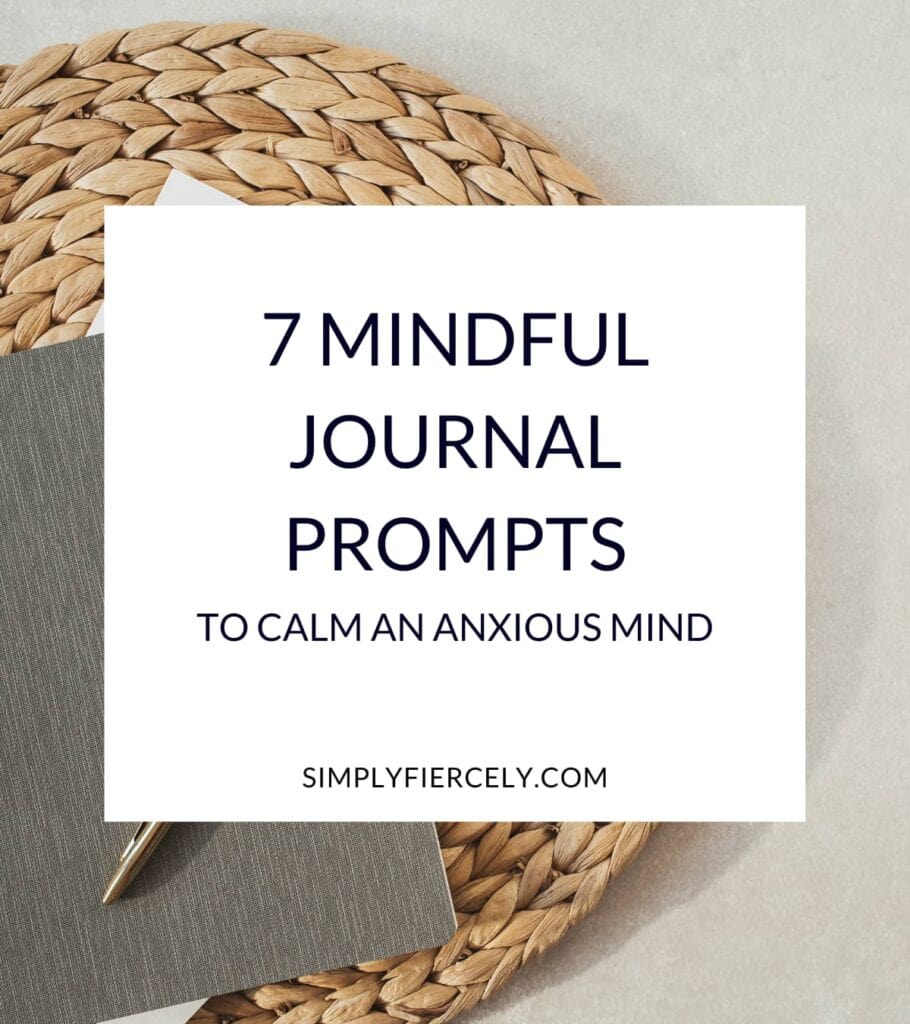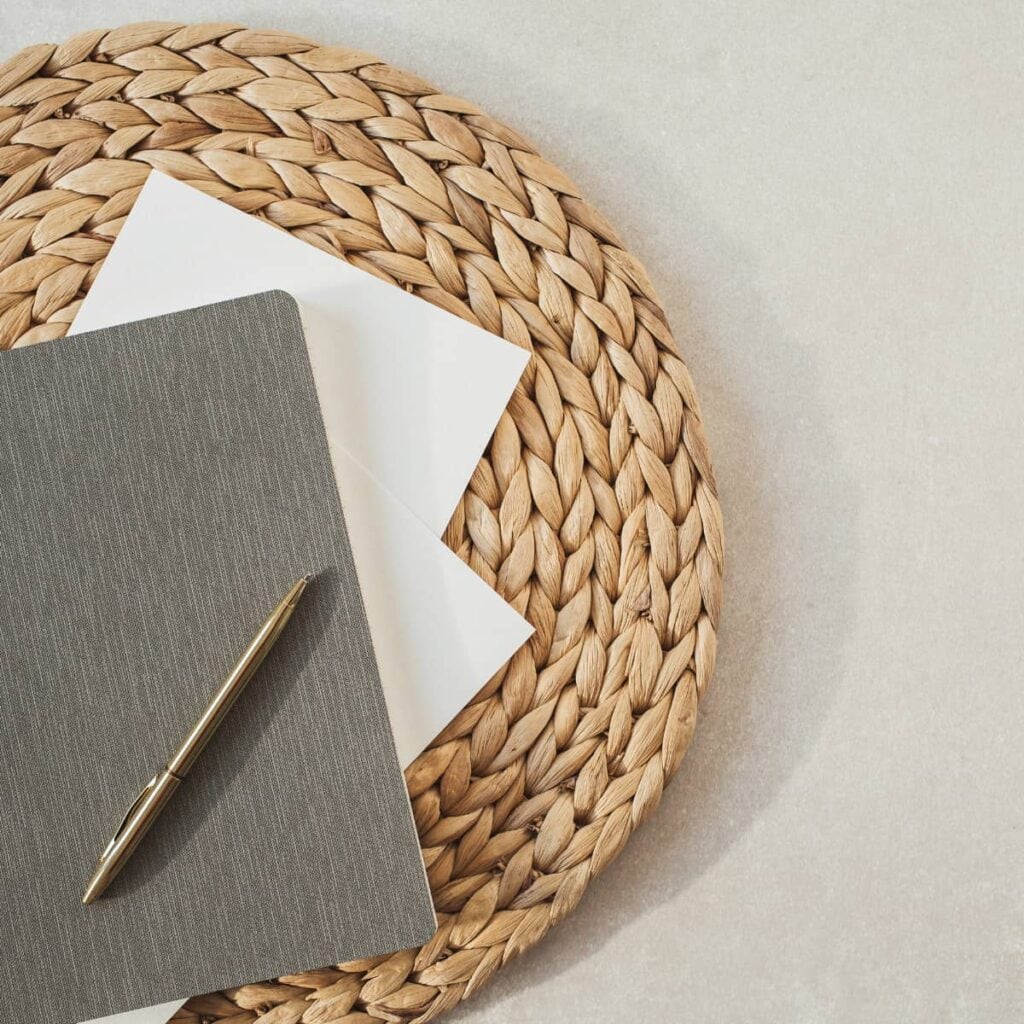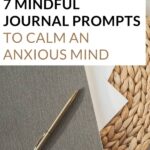Journaling is a great way to deal with anxious thoughts because it brings awareness to the present. With the right mindful journaling prompts, you can find more ease in your daily life.
I’ve been journaling for many years, and I recommend it to everyone. It’s a wonderful mindfulness exercise that’s especially helpful in times of anxiety and stress.
In a world where we’re often pressured to “toughen up” or “think positive”, your journal is one of the few places where you can be yourself. It’s a safe space to explore negative thoughts without fear or judgement; an invitation to slow down and move through feelings of anxiety—instead of denying them.
Journaling always leaves me feeling more calm, focused and capable. It’s one of the most effective anxiety relievers that I use in my life. Whether you already have a daily journaling practice or are new to the ritual, certain prompts can help to ease anxieties.
If this is something that you’d like to explore, read on for my favourite mindful journal prompts for anxiety and when you might find them helpful.

What Is Mindful Journaling?
Like any other mindfulness practice, mindful journaling is intended to bring more of your awareness to the present moment. Simply put, it’s the act of conscious writing. It can be particularly helpful for anyone that struggles with meditation because you go to the extra step of taking the thoughts from your mind and making them tangible by writing them down.
Related Post: How to Live In The Present (4 Simple Mindfulness Tips)
How Mindful Journaling Can Ease Anxiety
Mindful journaling can help to ease anxiety by allowing you to uncover the root cause of your stress. After all, one of the benefits of journaling is that it’s a reflective process. It helps you organise your thoughts, and because they’re written down, you have the chance to reflect on them too.
This is practical for a stressful situation because it affords you the time and mental space to think a problem through. And this is important because unchecked stress or anxiety is what usually leads to problematic coping methods. For me, this was a shopping addiction—but it could also be social media, alcohol, food or even overwork.
These coping mechanisms can turn into addictions because they are a temporary escape from problems. (Trust me, I would always go shopping when I wanted to avoid painful or difficult emotions.)
But mindful journaling provides a new way to face your feelings and concerns head-on. This will help you truly understand your issues and give you the clarity of mind you need to work them out properly.
It’s not about escaping your problems or pretending that a difficult situation isn’t happening. Instead, it’s about accepting and addressing it.
In the words of Eckhart Tolle, “As soon as you honour the present moment, all unhappiness and struggle dissolve, and life begins to flow with joy and ease.”
And while I wouldn’t say that all unhappiness and struggles disappear, I can confirm that honouring my anxiety through mindful journaling helps me create ease where there was once only stress.
How To Start Mindful Journaling To Ease Anxiety
If you’re new to journaling, you might be hit with ‘writer’s block’. Remember, any new behaviour or practice can take getting used to. As a start, you might find it helpful to set a five or ten minute time limit to help you stay on task.
Be intentional about creating time to write your feelings out. Turn it into a ritual by making yourself a warm drink, lighting a candle, or choosing a nice spot to write in. This might help you create a daily routine in the future.
When you’re ready to get writing, the following list of journal prompts may help alleviate anxious feelings.
7 Mindful Journaling Prompts For Anxiety
Each problem is different. So, I have a roster of mindful journaling prompts that I turn to depending on the issue or feelings that I’m overcome with. I’ve included an example of a situation when each writing prompt is most helpful to use.
Prompt: What Am I Feeling Right Now?
Use when: You feel like you need to empty a racing brain.
This prompt aims to create space to think. I use it when my mind is so busy that I can’t focus or when I’m feeling overwhelmed. By the end, your mind should feel empty, which always helps to calm anxious feelings that come from an overactive mind.
To do this, I use a prompt that starts a stream of unconscious writing. Asking myself what I feel in the moment is open enough to allow for all thoughts to come through but focused enough to get me to start writing.
Once you start writing, don’t stop until you feel there is nothing else to write. This means you should write everything down, even if you begin to veer away from the prompt. Don’t pay any mind to spelling mistakes, your handwriting and don’t edit what ends up on the page. Just write it all out.
Sometimes I feel tired after doing this – the same way that I would feel tired after a physical workout. But it also comes with that fresh feeling of release too.
Prompt: What Am I Afraid Of?
Use when: You are overcome with worry.
A lot of the time, anxiety comes from fear. Unchecked fear can be crippling. By confronting our worst fears, we give ourselves the chance to move with and through them.
To journal through your fears, start by writing them out one at a time. Ask yourself what are the worse case scenarios, how they might affect you, and what you would do. Ask yourself how likely it is to happen, why you think it might happen, whether its occurrence would be positive or negative and why.
Allowing your fears to play out in your journal helps to challenge the legitimacy of these fears. It’s also a chance to discover how you would address them, which can make you feel more prepared.
The anticipation of something is usually much worse than when it actually occurs. This is because before something happens, we can’t do anything about it. By journaling through our fears, we’re doing something proactive and preemptive, which can help us work through our fears rather than letting them fester.

Prompt: Write A Letter That You’ll Never Send
Use when: The thought of someone is making you anxious.
Sometimes our anxiety is tied to a person. Whether it is a colleague at work, a family member or a friend – honest confrontation can help clear the air. But sometimes, you can’t have an open conversation with people without consequence. For example, a candid conversation with a past partner or your boss might not be the best idea. This is where an unsent letter can really help.
Most of us have written a truthful text or email, deleted the words, but still felt better. Writing an honest letter that you’ll never send can work in the same way.
Address the letter to the person you need or want to talk to and say everything you want to say. This prompt will help you organise your thoughts and feelings about this person. You can also be as honest as you need because you’re never going to send the letter.
Laying it all out feels therapeutic, but it also helps us see what is important to bring up with that person and gives us a chance to find a respectable way to approach it. It can also bring to light what we should just let go of.
If you enjoy letter writing, you could also try a love letter. Write to your younger self (or your future self!) and practice being your own best friend. After all, self-love and compassion are also powerful tools for combating chronic anxiety.
Prompt: Where Am I Right Now?
Use when: You need to feel grounded.
The 5-4-3-2-1 coping technique for anxiety attacks is all about bringing your attention back to the now. This technique helps to ground me in the moment when I feel anxious about the past or future.
Many people simply think through this exercise, but I find that writing it out is more effective if I’m stressed. In your journal, write the following:
• Five things that you see
• Four things that you can touch
• Three things that you can hear
• Two things that you can smell
• One thing that you can taste
Bringing attention to your senses gives you a chance to pause and acknowledge where you are in detail. It will stop your mind from bouncing between thoughts and give you a moment to focus on a sensory experience that will ground you in the present.
Prompt: Why Do I Feel Unwell?
Use when: You’re feeling agitated, stressed or anxious for no apparent reason.
When we feel anxious for no reason, it’s usually because our cup needs to be filled. But sometimes, knowing what we need isn’t obvious. To practice the most effective self-care, we should try and inform our approach.
When I’m so overwhelmed that I can’t think about how to care for myself, I turn to my journal. I start with the line ‘I feel unwell because…’ and let my thoughts flow. Answering this question leads me to discover what I need (whether it be rest, connection, or creative expression). By delving into why I feel unwell, I learn what I can do about it, which improves how I care for myself.
Related Post: Self Care Journal Prompts For When Times Are Tough
Prompt: How Can This Moment Inform My Future
Use when: You feel like you’ve made a mistake.
Mindfulness is purposefully paying attention to things that happen to us. Reflecting on the present will help us make better choices in the future. If you’ve done something that leads to your happiness, you want to do more of that in the future.
It’s also beneficial to reflect on negative situations, particularly if they are the result of a mistake that we’ve made. Taking time to acknowledge our mistakes, understand why they occurred, and think about how we can make better choices in the future is healthy.
It allows us to get familiar with the feeling of making mistakes and turn them from negatives to positives. Mistakes are inevitable and mindfully working through them helps us accept them as part of life and let go of perfectionism.
Prompt: I Am Lucky To…
Use when: You are feeling negative.
Gratitude is one of the healthiest emotions to sit with. It has the power to shift your mindset from scarcity to abundance, which can be helpful when you’re feeling stressed or just plain having a bad day.
Write down what you are lucky to have, be or experience and why. Get into detail about how these things enrich your life, what you have done to cultivate them in the past, and how you can focus on them in the future.
Be creative with this. If you struggle to list things, try reflecting on:
- a favourite memory
- your own strengths
- song lyrics or a list of favourite songs
- your greatest lessons
- your biggest supporter
- how you overcame a negative experience in the past
Keeping a gratitude journal can help to shift your focus and change your outlook. It’s also lovely to reflect on these lists and understand what is important to you.
Want to learn more about journaling? Check out my top journaling tips and my favourite morning journal prompts.
Dealing With Anxiety
According to the National Institute of Mental Health, almost 20% of US adults struggle with anxiety. If you’re going through a tough time, I hope that some of these journaling ideas will be helpful.
But if you’re struggling with an anxiety disorder, don’t be afraid to seek out professional help as well (if those resources are available to you). Journaling is a powerful tool, but it never hurts to expand your support system. At the end of the day, asking for help is often the best thing you can do for yourself.
What are your favourite journal prompts for anxiety? I’d love to hear from you in the comments!


Thank you for sharing this! I have random anxiety attacks, that seem to appear out of nowhere. They aren’t as frequent as they used to be, pre-meds for generalized anxiety, but when they happen, I am at a loss of what to do, as I usually have no clue why I am having them. I’ve always loved writing and I used to write in a journal a fair amount (about random things) but I love this article you have shared, as well as your own experiences, to help better navigate and find a way through anxiety.
I’m so glad to read this article. Its give energy to me to feel happiness and reduce my own anxiety. Fortunately, I grateful to become a journaler. Everday I obligaze myself to write a grateful journal, and as long as I remember I have accomplished this amazing thing in accordance my daily targets.
One again, thanks for presenting this beauty article.
Jakarta, Indonesia.
Hi Jen,
Thank you for this post and all the good work you do to help others thrive. Several of your prompts interested me. The one that most speaks to me now is: “What am I afraid of?” I am a journaler, however, not every day. I haven’t used the prompt yet and I will. I very much like the idea of free-writing – whatever comes to mind on the subject. I can see how this would help me reflect and perhaps, burst a few balloons of worry in the process. Also, it would help me zero in on the most important thing for me to take care of now. I can’t wait to start this evening. Gratefully, Janet M, Long Island, NY USA.
I just made a mistake and I love the prompt how can this inform my future. The word choice inform is very powerful. Thank you!